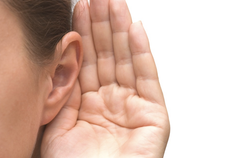Although most cases of hearing loss are similar in terms of symptoms and can be addressed by the same solutions (often hearing aids), it’s important to distinguish among the various types of hearing loss, usually related to their cause.
- Noise Induced Hearing Loss: Also known as NIHL, this type of hearing loss is caused by exposure to loud noises over 85 dB for a prolonged period of time. Check out our blog on Noise Induced Hearing Loss to learn more about it and also how to protect yourself from dangerous decibels.
- Drug Induced Hearing Loss: Medications that cause hearing loss are referred to as ototoxic, literally meaning “ear poisoning”, and can affect the auditory system after extended usage. Aspirin is one of the most common culprits; our previous blog explains more about DIHL and provides a list of ototoxic medications.
- Trauma: Clumsy people beware: all that banging around can lead to no good. Physical head injury, including impairment to the temporal lobe, punctures to the eardrum or any damage to the middle ear structures can effectively cause hearing loss.
- Presbycusis: This is a type of sensorineural hearing loss that occurs in individuals later in their lives. It is most commonly caused by gradual changes in the ear, for example the loss of hair cells as a person grows older. As a result, speech begins to sound muffled and unclear. Thankfully, hearing aids will easily fix symptoms of Presbycusis.
- Tumors: An acoustic neuroma is a type of tumor that grows on the nerve that connects the ear to the brain. Another tumor is a vestibular schwannoma that develops around the auditory nerve. Symptoms of tumors are hearing loss accompanied with ringing in the ears and a feeling of fullness. These tumors can be treated with surgery.
- Meniere’s Disease: This is a disorder of the inner ear that affects both hearing and balance. Fluid builds up in the cochlea and presents many problems from sensitivity to loud noises, tinnitus and ringing in the ears, dizziness and hearing loss. The cause of Meniere’s Disease is unknown and patients report varying degrees of severity in symptoms as well as episodes that come and go, often linked to times of stress.
- Otosclerosis: Often labeled as hereditary, otosclerosis is presented by abnormal bony growth on the middle ear bones. This growth limits the movement of the tiny bones, preventing sound being transferred to the cochlear, thus causing conductive hearing loss. The good news is that otosclerosis is often surgically treatable.
